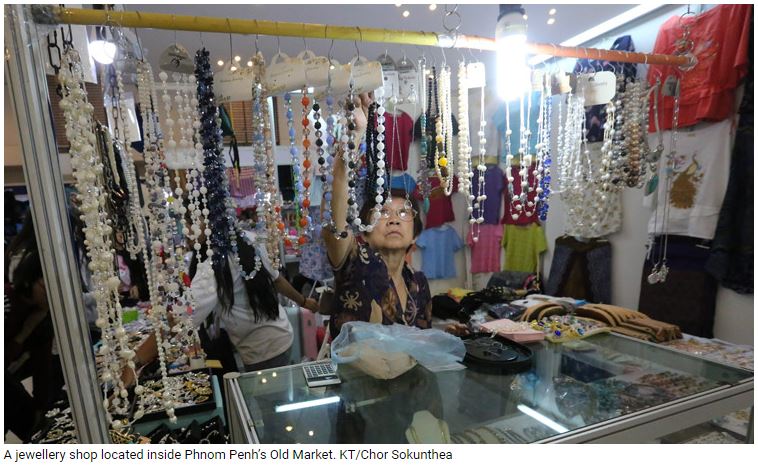Cambodia: Business as usual after the election
At a corner of the Old Market (Phsar Chas) near Phnom Penh’s riverside, a meat vendor calls on passersby with the hope they will turn their attention to the products she has to offer.
Khmer Times asks Teng Chanda – who has been struggling with a fall in business activity at her store – whether the low sales were the result of July’s general election.
She says the general poll did not have a major impact on her business, adding that the current fall in sales is likely due to seasonal variation in market activity.
“Sales have been tough for some time now and even before the national election there were signs that economic activity was going to slowdown,” says Ms Chanda, a long-time meat seller at the market.
While briskly trying to woo passersby to consider her meaty offerings, Ms Chenda tells Khmer Times her business is facing tough competition, with consumers having more choices than ever before following the opening of several meat shops in recent months.
“Sales are not good because customers go to other markets as they now have many more options.
“The decrease in sales is not the result of the elections. It is the result of a decline in the number of customers, many of whom are choosing to shop at other markets,” says Ms Chenda.
Unlike the 2013 poll, this year’s election was peaceful, with little or no impact on her business, she says. In the previous election there were many street protests, making it difficult for vendors to make a living, she adds.
“During the 2013 election, I was afraid of protests, but this time I felt it was business as usual. I was not that worried this time around,” Ms Chenda says.
“Sales here vary from day to day. Some days sales are very good, some days they are not. This is a normal situation for us. Some days, I have no sales at all. All the sellers here face a similar situation,” Ms Chenda says.
Most vendors in the market concur with Ms Chenda. They believe the election did not disrupt business activity, and is not the reason price levels for certain products have spiked in recent months.
While wrapping some fish for one of her buyers, Tep Montha, also a vendor at the Old Market, says prices have gone up in the last few months, but adds that she too believes it is not because of the election.
“The price of products already increased ahead of the elections,” Ms Montha says, explaining that price levels often fluctuate with season changes.
“Prices of goods have increased. Now, I want to see them go down. Otherwise, it will be difficult to sell my products. When prices rise, sales go down because buyers think we are trying to cheat them,” she says.
Businesspeople believe the Cambodian People’s Party’s victory in July’s election, which allow them to form a one-party government, will have a positive impact on the country’s investment environment.
Sear Rithy, CEO of Worldbridge Group, a leading real estate firm, says he is not worried about the election and the fact that the country has a one-party government. Talks of possible sanctions from Western countries do not trouble him either.
“For common folks and for investors the major concern is political stability. When there is political stability, successful investors and businessmen will spend money and invest. They are not worried and will not hold back.
“I believe that this one-party government will try its best, even more so than the previous ones. With a combination of experience from old faces and new, creative ones, the current government will do its utmost to achieve strong economic growth,” explains Mr Rithy.
Ho Vandy, secretary general of the Cambodia National Tourism Alliance, says the tourism sector has not been affected by July’s poll either.
“I observed that there was no significant impact in the tourism sector due to the election, but what we all in the sector can see is stability. Growth in domestic and foreign tourist arrivals is stable,” Mr Vandy said.
After the elections, the government established a Supreme Consultative Council composed of several political parties that raced alongside the CPP in the poll, but failed to secure any seats in the National Assembly. The aim is to take the views of these parties into consideration during the decision-making process.
Source: https://www.khmertimeskh.com/50537485/business-as-usual-after-the-election/


 English
English




